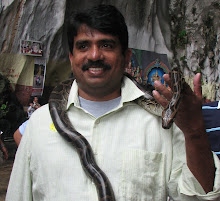As innocuous and cliched that this may sound in reality it is quite difficult to practice.
All around us, we have been told from early in life how things are, how they work, why things happen and why they don't. By the time one reaches one's teens, opinions have been formed on things that directly effect our daily life and we create a surreal bubble around us that explains to oneself what works and what doesn't. In one's twenties many of the created theories come crashing down by the weight of reality and one tends to substitute these with stronger theories (walls?) that explain the new phenomenon.
This soon gets extended to things that do not effect us directly like politics, movies, cricket, management etc. Of course we do get influenced by things that happen around us, people whom we interact with, books we read and TV shows that we watch, however we tend to gravitate towards those that have some connection with our earlier created theories thereby strengthening the walls.
Now re-look at the title "Question Everything". When we do, we come up with the same answer that we are trying to change by the questioning. As that's what we know and understand. So how can we question everything by keeping an open mind. One way that I have found effective is to have discussion with someone with a completely contrasting point of view without pre-judging that person or his/her point of view.
Take for example Hepatitis A (Jaundice) we have been told time and again this is a disease that effects the liver and since there is no known allopathic cure for this, there are a 100 local cures for this. The fact is that it is caused by a virus which infects the liver and can take anywhere between 3 weeks to 3 months for the patient to completely recover from it. This depends on a host of factors including but not limited to age, previous health of the patient, condition of the liver prior to the disease etc. As the symptoms of the disease include nausea and lack of appetite the patient reduces intake of food and tends to get weaker.
The Traditional cure includes having a no salt, no protein, no fat diet which especially in patients in which it lasts for a month creates further complications like Vitamin E deficiency (Vitamin E is only fat soluble and thus cannot be absorbed into the body without having some fat in the diet). Whereas the right diet includes small quantities of both protein and fat. But how can we question everything (remember the allopathic doctor says take rest have lot of fluids and there is no cure) when everyone around you are saying and truly believing what they say.
Another common example is the age old idiom "Feed the cold and starve the fever". While fighting the fever the body automatically loses its appetite but there is absolutely no gain in starving the fever one should take enough nutrients to fight both the fever and the cold.
The above examples though medical in nature just gives one the thought process that goes in one's mind before questioning conventional wisdom. One automatically assumes that some things that have been done in a particular way because of a reason and there must be some truth or logic to it. Thus we never really "Question Everything" let's try throwing conventional wisdom out (unless proven) before Questioning. Never assume anything in the questioning process.
